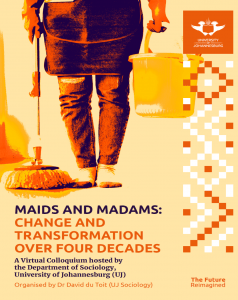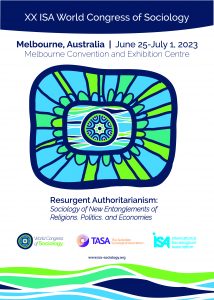Conferences and Colloquiums
Department of Sociology Symposium
19th -20th June 2024
UJ Arts Centre Auditorium
“30 Years of Democracy: Youth and Politics in South Africa”
To register for the Symposium, please click here
| Agenda | Time | Participants |
| Day 1 | ||
| Music (coffee) | 08:30 – 09:30 | DJ Thaps |
| Reflections on 1976: looking back and looking forward | 09:30 – 10:45 | Enos Ngutshane and Seth Mazibuko with Tshepo Moloi |
| Poetry Reading | 10:45 – 11:15 | Lesego Plank and Duduzile Ndlovu |
| Coffee | 11:15 – 11:30 | |
| Panel 1: Reflecting on Fees Must Fall and access to higher education | 11:30 – 13:00 | Hlengiwe Ndhlovu, Lerato Kgosiemang and Noor Nieftegodien |
| Lunch / Music | 13:00 – 13:45 | DJ Thaps |
| Panel 2: Youth political consciousness and contemporary South Africa | 13:45 – 15:30 | Hannah Dawson, Senzelwe Thembu, Nomzamo Ntombela and Fuzile Jwara |
| Closing | 15:15 – 15:30 | Malehoko Tshoaedi, Ingrid Palmary and Lerato Kgosiemang |
| Poetry workshop | 15:30 – 16:30 | Lesego Plank, Duduzile Ndlovu and Ragi Bashonga |
| Day 2 | ||
| Welcome and coffee | 08:30 – 09:15 | |
| Reflections on youth activism in democratic SA | 09:15 – 10:45 | – In conversation with Mosa Phadi Otsile Nkadimeng, Mbalenthle Mkhize; Amanda Gouws; |
| Poetry reading | 10:45 – 11:15 | Duduzile Ndlovu and Lesego Plank |
| Coffee | 11:15 – 11:30 | |
| Panel 3: Climate activism: emerging themes and methods | 11:30 – 13:00 | Brandon Barnes, Thandokazi Maseti and Shazia Ebrahim |
| Lunch | 13:00 – 13:45 | |
| Panel 4: Youth, mental health and wellbeing: New perspectives | 13:45 – 15:15 | Nokulunga Shabalala and Lesedi Kgatla |
| Closing | 15:15 – 15:45 | Malehoko Tshoaedi, Lerato Kgosiemang and Ingrid Palmary |
Concept Note
This symposium intends to inspire critical thinking and debates on the role of youth in consolidating democracy in South Africa. It happens at a significant moment in our country when we celebrate 30 years of democracy. As we reflect on this journey, we turn our attention to the youth, who played a key role in ending apartheid. Their activism, wrought by calls for liberation and emancipation, culminated in the democratic country in 1994.
The symposium seeks to reflect on the continuities and discontinuities of political activism and the social issues that concern young people. Sadly, this reflection is done against the backdrop of significant challenges facing the youth, which places the country in a precarious position. Unemployment stands at 45.5%, and those in employment face challenges in securing decent employment and wages. This has resulted to widespread poverty and inequality, which continue to fuel community protests and student activism. Lately, we have witnessed escalating protests over poor service delivery, unemployment, crime, and gender-based violence, as well as students’ protests against outsourcing, fee increases, and the decolonisation of education. It is therefore, necessary to appraise the social, economic, and political landscape in which young people find themselves given the recent democratic elections, as we commemorate the 16 June 1976.
SASA 29th Annual Congress 2024
Dates: Wednesday, 1st – 4th July 2024
Venue: Stellenbosch University, South Africa
Theme: Sociology and its Publics: Institutions, audiences, and vocabularies in a new era of contestation
The 29th SASA Congress will take on a hybrid format with a combination of virtual and face-to-face presentations.
Abstract submission process:
Abstract Deadline: 29 March 2024.
Abstracts should be no longer than 250 words.
Submissions are encouraged in these themes (see the call for papers), or in others organized in our SASA working groups, listed at: https://sociology.africa/annual-conference/sasa-working-groups
Please email abstracts, together with author details to: sasa2024conference@gmail.com AND cc’ the appropriate SASA working group convenor with your submission.
Details on registration to follow shortly on the SASA website
SASA 27th Annual Congress
Dates: 10th -13th July 2022
Venue: Sol Plaatje University (SPU), Kimberley, South Africa
Theme: Sociology and COVID-19 pandemic: Reimagining the present and the future
The 27th SASA conference will happen during a period when the global community is still grappling with the new normal. This conference will thus take a hybrid format (a combination of virtual and face to face presentations) in line with the COVID 19 protocols.
Abstract Deadline: 01 April 2022.
Abstracts should be no longer than 250 words.
Find the call for conference abstracts/papers here.
Conference communication and abstract submission may be directed to: conferences@sociology.africa
XX ISA World Congress of Sociology 2023
Resurgent Authoritarianism: The Sociology of New Entanglements of Religions, Politics, and Economies
The global rise of authoritarianism, as well as populism, xenophobia, and racism, makes our task as sociologists more crucial than ever. This dilemma is assisted by the gradual symbolic thickening of public culture through combinations of extreme nationalist and religious fervour.
What is the best way to analyze global resurgent authoritarianism? In addition to dealing with the scars of the colonial era, a postcolonial approach should be supplemented with another approach; we need to find ways to diagnose and resist this resurgence. This approach should take into account how authoritarianism affects not only our societies but also our knowledge production. The self-centred and unspoken have become more important than the told and argued. We are concerned not only with the hard authoritarianism that heralds the brutalization of society and politics, but also the soft authoritarianism that often thrives in the shadow of neoliberalism, as the state moves deftly in the open or in secret to devise modes of governance that shore up its power against popular discontent.
A special interest of our Congress is how to disaggregate the Western, but also sociological, assumption of secularism as inherent in modern society and at the same time analytically dissociate the state from religion. While this separation is still a crucial pathway toward democracy and citizenship, the process needs to be problematized. We particularly look forward to discussing the promising avenues of inquiry within sociology and related disciplines about what has been termed ‘post-secular societies’ and ‘multiple secularities’.
Thus the XX ISA World Congress of Sociology will focus on how sociologists worldwide can (and do) contribute to the understanding of the resurgent authoritarianism and analyze the new entanglements of religions, politics, and economies. It will also focus on how sociologists engage (physically and critically) in the formidable social movements we are witnessing today in different parts of the world and in a renascent civil society.
The XX ISA World Congress of Sociology in Melbourne, Australia, June 25-July 1, 2023 will be in a hybrid format. Further details will be provided in due course.
Sari Hanafi, President of the International Sociological Association




